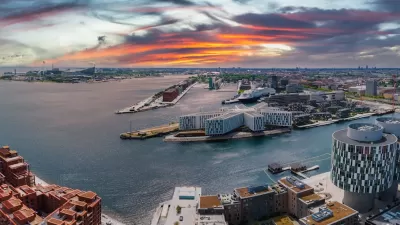Felicity Barringer looks at an innovative program being tested in Seattle to incentivize commercial property owners to undertake major energy efficiency retrofits. A partnership between skeptical building owners, investors, and utilities is key.
As Barringer explains, 'deep retrofits' are a hard sell to the owners of older, smaller commercial buildings, "which, according to a new report [PDF], account for 47 percent of all commercial real estate outside the world of malls."
"In a new twist, some investors, a technology company, a municipal utility and an environmentally oriented foundation have joined forces to show that major energy-efficiency improvements in commercial buildings may provide alluring new revenue to all involved."
"The basic plan intends to ensure that utilities lose none of the revenue that supports their fixed costs — wires and other infrastructure — while allowing them access to a new power source," she explains. "The energy not used by Bullitt or any other building is purchased by the utility in a 30-year contract, just as if they were purchasing hydropower or coal-fired electricity."
"The utility was not easy to convince," she adds. "As 'Disruptive Challenges,' a recent report [PDF] from the Edison Electric Institute shows, the industry is getting increasingly nervous about its long-term ability to finance its infrastructure costs in a new world of efficiency and renewable energy."
"As Jorge Carrasco, the superintendent of Seattle City Light, explained it, any utility executive must think 'about what does this new approach do from a financial standpoint to an entity that makes its living by selling energy?'"
FULL STORY: Making Energy Efficiency Attractive for Owners of Older Seattle Buildings

Planetizen Federal Action Tracker
A weekly monitor of how Trump’s orders and actions are impacting planners and planning in America.

Maui's Vacation Rental Debate Turns Ugly
Verbal attacks, misinformation campaigns and fistfights plague a high-stakes debate to convert thousands of vacation rentals into long-term housing.

Restaurant Patios Were a Pandemic Win — Why Were They so Hard to Keep?
Social distancing requirements and changes in travel patterns prompted cities to pilot new uses for street and sidewalk space. Then it got complicated.

In California Battle of Housing vs. Environment, Housing Just Won
A new state law significantly limits the power of CEQA, an environmental review law that served as a powerful tool for blocking new development.

Boulder Eliminates Parking Minimums Citywide
Officials estimate the cost of building a single underground parking space at up to $100,000.

Orange County, Florida Adopts Largest US “Sprawl Repair” Code
The ‘Orange Code’ seeks to rectify decades of sprawl-inducing, car-oriented development.
Urban Design for Planners 1: Software Tools
This six-course series explores essential urban design concepts using open source software and equips planners with the tools they need to participate fully in the urban design process.
Planning for Universal Design
Learn the tools for implementing Universal Design in planning regulations.
Heyer Gruel & Associates PA
JM Goldson LLC
Custer County Colorado
City of Camden Redevelopment Agency
City of Astoria
Transportation Research & Education Center (TREC) at Portland State University
Jefferson Parish Government
Camden Redevelopment Agency
City of Claremont





























